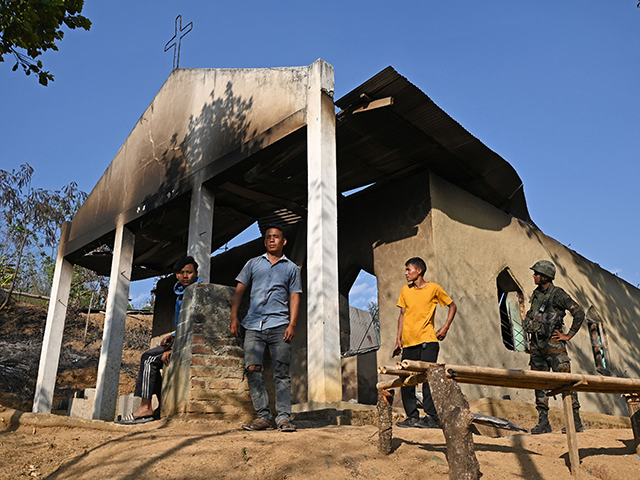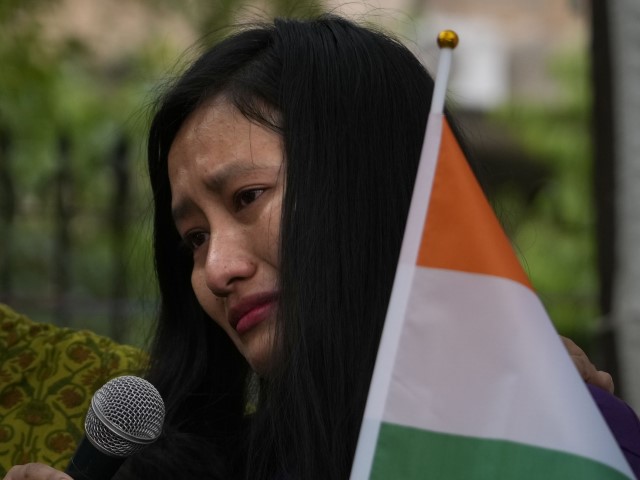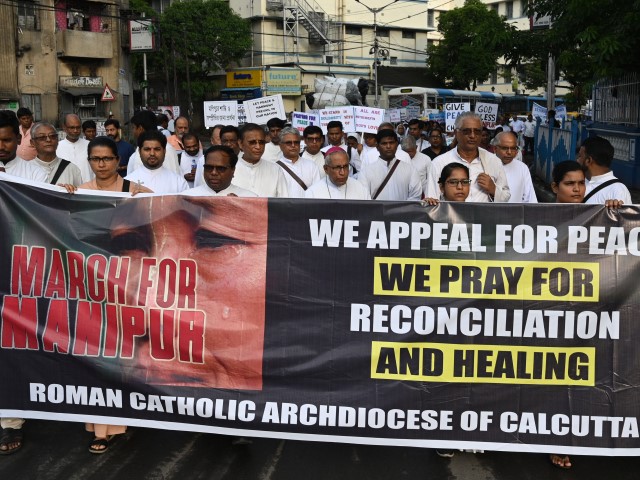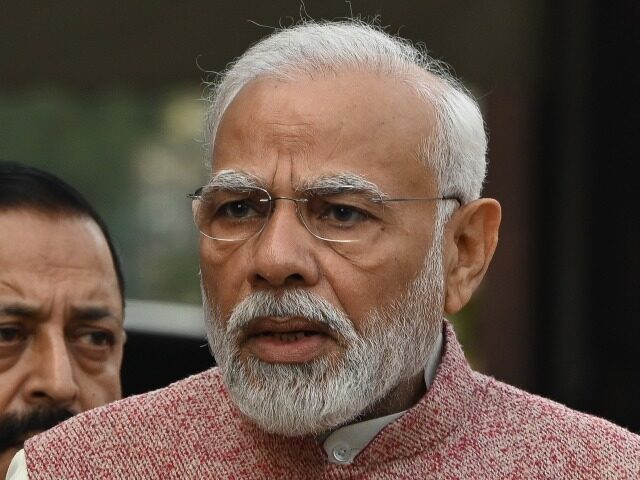Christian tribes living in northern India’s restless state of Manipur say the Hindu nationalist government of Prime Minister Narendra Modi is falsely classifying them as “illegal immigrants” so it can “deport” them to neighboring Myanmar.
The chief minister of Manipur, N Biren Singh, claimed on Wednesday that his administration has identified 5,457 “illegal immigrants” in Manipur and initiated the “deportation process” against them.
“In this crucial juncture, we have noticed certain homegrown groups, based out of western countries, criticizing the steps taken up against illegal immigration by giving a communal tone and propagating it as violations of religious freedom,” Singh complained.
He claimed:
Ironically, this lobby is quiet about western countries’ stance against illegal immigration, but raises objections to the actions taken in Manipur, India. This selective outrage raises concerns about the agendas and propaganda pursued by these groups with secessionist tendencies.
Singh insisted that deporting these “illegal immigrants” was vital to the “survival of indigenous people.” He also said that even though the situation was “alarming,” his administration has taken care to provide humanitarian assistance to the illegals.
India’s NDTV suspected Singh was complaining about the North American Manipur Tribal Association (NAMTA), a Texas-based non-profit determined to “perpetuate, preserve, and maintain the heritage of the peoples of the hill-tribes of Manipur.”
NAMTA testified before the United States Congress on May 6 that the Indian government, currently dominated by Prime Minister Modi’s Hindu nationalist BJP party, is persecuting the Christian tribes of Manipur and violating their religious freedom.
Manipur is broadly divided between a Hindu tribe called the Meitei who live in the lowlands and minority Christian tribes such as the Kuki who live in the hills.
Long-simmering tensions between the two groups boiled over in May 2023 when the Meitei, who are unquestionably the majority population of the province, demanded access to the same minority programs provided for the hill tribes. Violence ensued and Manipur has come close to a full-blown civil war several times over the past year. Entire Christian villages were burned to the ground, displacing thousands of residents.

An Indian army soldier (R) stands along with villagers in front of a ransacked church that was set on fire by a mob in India’s Manipur state on May 8, 2023. (ARUN SANKAR/AFP via Getty)
The Indian opposition strongly criticized Modi for ignoring the crisis, while Manipur’s Christians accused the BJP government of actively siding with the Meitei. Singh often railed against “militant groups” and “terrorists” but Kukis had the distinct impression he wasn’t talking about the Meitei mobs.
Manipur was actually controlled by Burma (now Myanmar) until India annexed it in 1949 and formally incorporated it as a state in 1972. The Modi government often complains about people illegally crossing the border from Myanmar and setting up drug farms in the hills.
Kuki advocates, such as NAMTA, say those people should be treated as refugees fleeing from religious oppression in Myanmar. The Buddhist nationalists who rule Myanmar are notorious for driving the Rohingya Muslims to the brink of genocide, but they have also brutally persecuted Christian tribes.
The head of NAMTA’s Canadian chapter, Lien Gangte, told Congress his family became internally displaced after the riots in Manipur’s capital of Imphal in May 2023, and many Meiteis joined the Kukis in fleeing from the violence.
“Today over a year after my family lost everything, we still have no idea if or when our issues will ever be resolved. Will we ever get justice?” Gangte said.
“My people have been subjected to ethnic cleansing,” he said. “It had become an existential crisis, and we had to fight for survival.”

A Kuki tribal woman breaks down while narrating the ordeal of her escape after her village was burnt down, during a sit-in protest against the killing of tribals in their northeastern home state of Manipur, in New Delhi, India, Monday, May 29, 2023. (Manish Swarup/AP)
Like many other critics, Gangte said the Modi government “decided to take sides with the majority Hindu Meiteis,” until the Christian tribes and their international advocates prevailed on the government to “fulfill its constitutional duties” and “provide basic security and justice for our people.”
Commissioner David Curry of the U.S. Commission on International Religious Freedom (USCIRF), who also attended the congressional hearing, said “these instances in Manipur mark a broader, widespread pattern of deteriorating religious freedom conditions throughout India.”

Members of Catholic Association organized a march for Manipur seeking peace in Manipur at Park Street, on July 16, 2023 in Kolkata, India. (Samir Jana/Hindustan Times via Getty)
The Indian government has evidently decided to handle these allegations of labeling Christians as illegal aliens to hustle them out of Manipur by attacking NAMTA and other Christian groups as allies of the Khalistani Movement, the Sikh separatist organization that India views as a severe threat to its national security. Both Canada and the United States have accused India of organizing the assassination of Khalistani activists on foreign soil.
NDTV strove to directly link Gangte to “Khalistani terrorist Hardeep Singh Nijjar,” who was allegedly murdered by agents of the Indian government in Canada last june. The Indian government began blocking NAMTA’s social media accounts last year after “intelligence agencies” began monitoring the group’s “alarming” activities.
“The NAMTA members have been repeatedly defaming India and maligning the country’s image on the world stage. They have become more aggressive, coincidentally, when the Lok Sabha elections are going on,” an unnamed Indian official told NDTV.
“We have been monitoring them. Their activities are getting closer to groups that work to sabotage India’s standing in the world,” the official said.
Indian officials also trashed the U.S. State Department’s recent report on declining religious freedom in Manipur as a “deeply biased” document that “reflects a very poor understanding of India,” and suggested the real reason violence broke out in Manipur was that Indian police did such a good job of shutting down the drug trade, depriving the Kukis of much-needed income.
Christians marked the first anniversary of the Manipur riots on May 3 with an interreligious prayer gathering at the Sacred Heart Cathedral in New Delhi. The service was led by black-clad Kuki refugees singing hymns and leading a candlelight processional.
“The Church, the civil society, and others are trying their best to offer consolation and relief to the affected. We pray that the displaced can go back to their lands. Let the lights we hold dispel darkness and hatred from the minds and inspire all to live in peace, harmony, and brotherhood,” Delhi Archbishop Anil J. Couto, secretary-general of the Catholic Bishops’ Conference of India, said at the gathering.
“As we join together in this solemn candlelight prayer, our hearts are heavy with the burden of suffering endured by the people of Manipur,” said Divine Word Missionary priest Father Norbert Herman, organizer of the event. “For a year now, violence has marred their lives, casting shadows of fear and uncertainty in their path. In this hour of darkness, we stand in solidarity, offering our prayers as beacons of hope to illuminate their journey toward healing and peace.”
The Meitei have their own outreach group, the Global Meitei Alliance (GMA). On Thursday, the group asked the United Nations to investigate satellite photos that purportedly show massive opium poppy fields in hill country controlled by the Kukis, as well as allegations that American institutions are providing arms to Kuki militants.
GMA “strongly condemned” NAMTA’s testimony before Congress as a “blatant distortion of facts and deceitful narratives surrounding the ongoing mayhem in Manipur.”
GMA called on institutions like USCIRF to reject claims that Christian minorities are being persecuted in Manipur as “categorically false” and dismissed NAMTA as a “fringe Kuki group” that was spreading “false propaganda.”
The Meitei alliance said the real story in Manipur is that Kuki “expansionists” are trying to create a secessionist state called “Zale’n-gam” by “balkanizing the established territories of India, Myanmar, and Bangladesh, with Manipur as the epicenter.”

COMMENTS
Please let us know if you're having issues with commenting.